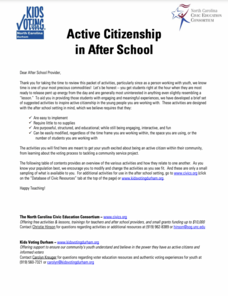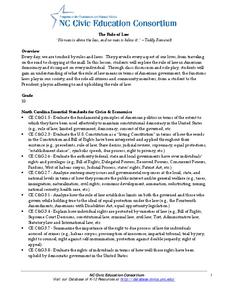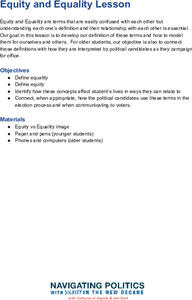Facing History and Ourselves
What's In a Name?
Rumpelstiltskin understood the power of names. The second lesson in the First Days of School series focuses on building community by recognizing the importance of the relationships among names, identities, and cultures. Learners engage...
Carolina K-12
Political Parties and Conventions
The two major parties polarize many in America today, but it doesn't have to be that way in the classroom! Teach learners about political party platforms and modern campaigns with a mock political convention. After watching a PowerPoint...
Carolina K-12
The Twenty-Sixth Amendment and the Power of Youth
Empower teenagers to take political matters into their own hands! After completing an engaging warm-up activity, class members discuss both sides of the youth voting issue, learn about the connection between military history and the...
Carolina K-12
Active Citizenship in After School
Active citizenship is the bedrock of any great democracy. Continue the trend by teaching the next generation about voting rights and the functions of elections in society. The variety of activities in the resource includes a human...
Carolina K-12
African American Troops in the Civil War
Middle schoolers explore the history of the African-American troops that served during the American Civil War. After reading primary source documents that detail the controversies about permitting freemen and former slaves to serve,...
Carolina K-12
World War II through the Radio Waves
Young historians channel the very medium used to convey news during World War I. They create and present a five-minute radio broadcast on a particular topic from the war, such as the roles of African Americans and women, war bonds,...
Carolina K-12
The End of World War II: Pearl Harbor, Japanese Internment Camps, and the Atomic Bomb
The end of World War II saw major events that would forever change the global landscape and international relations. Using a fantastic PowerPoint presentation and several primary source documents, your learners will discuss the bombing...
Carolina K-12
The Rule of Law
What functions do laws serve in our society? Your learners will be guided through several interactive activities to address this question, and to consider the impact of rule of law in American society.
Carolina K-12
Revolutionary War Era Tick-Tack- Toe
So many fantastic activities on the American Revolution! From drawing political cartoons illustrating events of the Boston Massacre to writing a diary entry as a shopkeeper during the Boston Tea Party, your young historians will...
A&E Television
Documenting Democracy: Lesson Plans on the United States Constitution
Balance and compromise. Class members come to understand the importance of these concepts as they investigate the concerns of the various stakeholders and how the format of the Constitution addressed these concerns.
PBS
Reading Adventure Pack: Government
A reading adventure pack looks closely at government with the help of two books—one fiction, one nonfiction, and a series of activities. Learners craft a mobile to visualize a balanced government, participate in a scavenger hunt around...
Facing History and Ourselves
Identity Charts
Many factors shape the identity of persons, communities, and even nations. Tweens and teens have an opportunity to consider the many aspects of identity as they create a graphic that reflects who they are. Class members first brainstorm...
Facing History and Ourselves
Bio-poem: Connecting Identity and Poetry
Writing a bio-poem is a great way to have young scholars go below the surface and reflect on who or what has made them who they are. Check out this richly detailed lesson that provides step-by-step directions for crafting a bio-poem.
Albert Shanker Institute
Who Was Bayard Rustin?
Who was Bayard Rustin? Pupils analyze a series of primary source documents to learn about this important figure in the civil rights movement. The lesson contains a short film to watch along with guiding questions and other resources...
Albert Shanker Institute
The March on Washington Logistics Then and Now
I have a dream ... that all pupils will be able to organize a march of their own after learning about how Bayard Rustin organized the 1963 March on Washington for civil rights. Young reformers work collaboratively examining informational...
Miama-Dade County Public Schools
African Americans and the Civil War
The American Civil War is the theme of this packet of materials prepared for Black History Month. Class members learn about the roles that African Americans played during the Civil War and examine the African-American experience after...
Newseum
You Can’t Say That: Right to Know vs. Security Risk
Print or block? That is the question young journalists debate as part of their study of the freedom of the press. Half the class represents the journalists' legal team, and the other half represents the government's legal team. Teams...
Cultures of Dignity
Equity and Equality Lesson
Equality does not equal equity and this lesson explains why. Class members compare two images--one labeled "Equality" and the other "Equity." Using the provided discussion questions, they then develop definitions that distinguish between...
Facing History and Ourselves
Many Voices, One National Identity
To conclude the unit on "Exploring Identity in the United States," pupils consider whether it is possible to combine many voices into one national identity. After creating an identity chart that lists words, phrases, and images that they...
Facing History and Ourselves
Connecting to the Past
Young historians research the connections between their personal histories and the histories of our country to gain a deeper understanding of who they are. To begin, class members write about an object that they consider significant to...
Facing History and Ourselves
Identity and Choices
Timshel! Thou mayest! is the big idea in a lesson that reminds learners that they have choices about how they present themselves to others. To begin, individuals rate the degree to which the choices they make each morning are influenced...
Facing History and Ourselves
Identity and Labels
Scholars look at the connections between identity and labels, assumptions, and stereotypes, in a lesson that examines identity in the United States. To set the stage for a discussion of these connections, class members analyze a cartoon,...
Facing History and Ourselves
Identity and Names
Would a rose smell as sweet, as Juliet Capulet asserts, if called by any other name? The importance of names and the connection between names and identity are examined in a lesson that explores identity in the United States. After...
Facing History and Ourselves
Finding Your Voice
To begin a study of what it means to be American, high schoolers first consider their own identities. They draw a picture of what they think an American looks like and share their images. Next, they examine an image of the "Flag of...

























